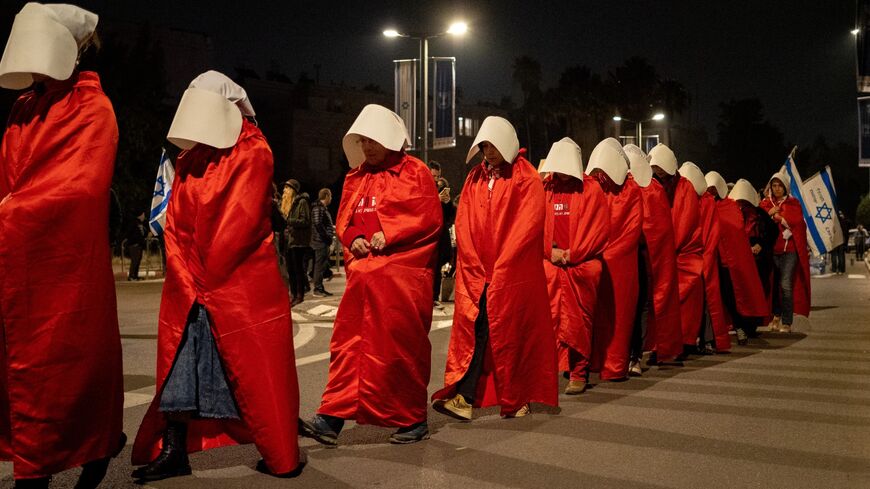Some 150 women clad in red cloaks and sporting oversize white bonnets obscuring their faces have taken to the streets in Israel, in the midst of the massive pro-democracy protest organized in Tel Aviv last week.
The organizers told Al-Monitor that their protest, inspired by Margaret Atwood's fictional book "The Handmaid's Tale", channels power through silence and is a dire warning to Israelis of what could come if the far-right gets the final word.
This was not the first time these women have marched while dressed as characters from the book and the Hulu TV series, depicting a dystopian society that relegates women to child-bearing slavery.
The plot takes place in a totalitarian state called Gilead, established following a second American civil war and ruled by radical religious extremists who turn women into the property of the state and its elites.
The popular series, which has been screened in Israel, has inspired women’s rights groups in the United States, United Kingdom, Italy, Argentina, Ireland and elsewhere. The Guardian described it as “one of the most powerful current feminist symbols of protest.”
Some three weeks ago, protesters in red cloaks and white bonnets emerged in Israel as part of the massive pro-democracy movement seeking to block a blitz of government legislation that gravely weakens the country’s top court.
It started off spontaneously as an initiative by a group of apolitical social activists calling itself “Building an Alternative,” comprised of women from across the social-political spectrum — secular, religious, ultra-Orthodox, Arab, Jewish — campaigning for equality and against violence. Responding to a suggestion by one of the group’s members, a few women adapted red cloaks that were sold as Little Red Riding Hood or Wonder Woman costumes, and sewed the white bonnets. They then took to the streets to join the nationwide protests. Their debut appearance took place in Jerusalem last month in front of the Knesset and Supreme Court.
Amazing handmaid's tale demonstration today in Tel Aviv. Israeli women know that without democracy their civil rights are at risk.... pic.twitter.com/mO8Dlq0mWV
— Roy Salomon (@royesal) February 25, 2023
The effect was powerful and immediate, with the women featured in key foreign media outlets, such as CNN, Fox News, Der Spiegel and Le Monde. Atwood herself retweeted two posts from Israel that explained “what can happen when a group of fanatical religious men takes over,” a reference to the religious nationalist partners in Israel’s coalition government and its meager representation of women.
Hundreds of women have joined the initiative that became known as the "slave march," and have taken part in protests throughout the country recently in an effort to draw attention to the potential damage to women resulting from the legal reform and other proposed bills being fast-tracked through the Knesset.
Hadas Ragolsky, a veteran journalist and one of the initiators of the Israeli "slave march," told Al-Monitor that the effect on the disguised women was no less powerful than on the onlookers. “There is power in walking quietly, submissively, with your head lowered. It was a creepy sight for women who saw us and literally cried — and for us, too. Mentally it's a difficult experience — you only see a floor, a sidewalk, a limited view and you yourself can’t be seen because you're in disguise and you're part of a group."
According to Ragolsky, the “No to Dictatorship” slogan powering the expanding mass protests reflects a concrete fear. "We won't wait for them to impose [religious] head coverings on us, decide when we buy at the supermarket, where we sit on the bus and when we go with a sick child to the clinic,” she said, referring to ultra-Orthodox attempts to dictate segregation of women in the public sphere. “The new laws certainly endanger our freedom."
One of the laws in the pipeline would allow business owners to discriminate against customers on the grounds of religious belief. A religious doctor, for example, will be allowed to claim that for reasons of faith and modesty dictates he cannot provide medical services to a woman or employ a woman.
Women's organizations in Israel warn that this law will undermine women’s hard-won legal equality and their rights to employment.
c97e.jpg)
Rally in Tel Aviv's Dizengoff square, Feb. 25 2023 (Zkiva Klir)
Another proposed law would expand the powers of rabbinical courts to include rulings on civil, nonreligious matters. According to women's organizations, this would create a comprehensive legal system based on Torah law alongside the civil justice system based on state law. In other words, the country will have two different legal systems, based on different bodies of law and different concepts of justice.
Opponents of what is being described as a “regime coup” also fear that a weaker High Court would result in a violation of women’s rights, whether directly or indirectly.
Women’s representation in politics has experienced a historic setback in the government that took power Dec. 29. The coalition has an absolute male majority, with only nine of its 64 Knesset members being women (14%). The Knesset as a whole only has 29 female members out of 120 (24%), and only four women serve as chairs of the legislature’s 25 committees.
Against this backdrop, the "slave march" has become an important protest event, reminding protesters and the government that the "coup" will harm the status of women, their struggle for equality and their rights in the public sphere.
In another protest reflecting these deep concerns, signs appeared this week on Rothschild Boulevard in central Tel Aviv that said, “Women Forbidden” and on a parallel path another sign with an arrow and the words “Women That Way." Organizers of the display directed women to move to their “designated” walkways to illustrate that in the near future women’s rights to move freely in public would be heavily curtailed, even in a largely secular city such as Tel Aviv.
"When people ask what I’m afraid of, I say that the series of laws now on the table will harm all women, and that is very real,” Ragolsky said.








